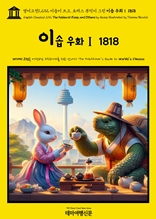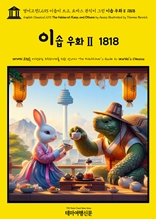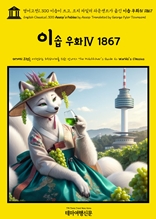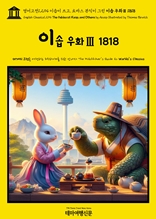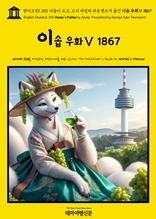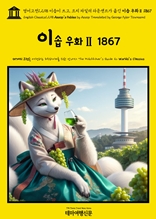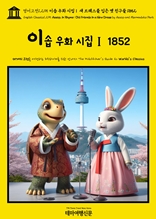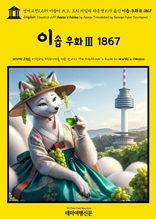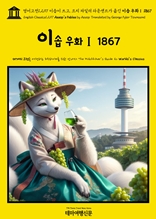영어고전1,292 이솝이 쓰고, 토마스 뷰익이 그린 이솝 우화Ⅰ 1818(English Classics1,292 The Fables of Æsop, and Others by Aesop Illustrated by Thomas Bewick)
도서정보 : 이솝(Aesop, B.C.620~B.C.564) | 2024-03-31 | EPUB파일
지원기기 : PC / Android / iOS
▶ 이솝이 쓰고, 토마스 뷰익이 그린 이솝 우화 1818(The Fables of Æsop, and Others by Aesop Illustrated by Thomas Bewick) 3부작 : 이솝 우화는 최초로 그리스어(Greek)로 작성되었으며, 이후 라틴어를 비롯한 다양한 유럽언어와 전 세계의 언어로 번역되면서 ‘인류의 우화집’으로 사랑받고 있습니다. 이에 따라 이솝 우화집은 수많은 시대와 언어, 편집자, 삽화가에 따라 수백, 아니 수천 종으로 발간되었을 정도로 수많은 판본을 자랑합니다. 이솝 우화집은 때로는 저명한 편집자의 판본으로, 때로는 당대 유명삽화가의 버전으로 지금 이 순간에도 세계 각지의 독자들의 손에 들려 있습니다. 테마여행신문 TTN Korea은 이솝이 쓰고, 토마스 뷰익이 그린 이솝 우화 1818(The Fables of Æsop, and Others by Aesop Illustrated by Thomas Bewick)을 3부작으로 소개해 드립니다. 188가지의 이야기를 특별한 순서없이 배열한 초기 이솝 우화집(Early Aesop's Fables)으로, 영국의 자연사 작가(Natural History Author)이자 목재 조각사(Wood Engraver) 토마스 뷰익(Thomas Bewick, 1753~1828)의 유려한 삽화 324 점이 실려 보는 즐거움을 더하는 작품입니다. 테마여행신문 TTN Korea 영어고전(English Classics) 1,999선과 함께 어제도, 오늘도, 내일도 멋진 문학여행을!
▶ THE PREFACE DEDICATORY. To the Youth of the British Isles. In collecting together, for your use and benefit, some of the prudential maxims, and moral apothegms, of the ancient sages, the Publishers of this volume have been stimulated by an ardent desire to render this excellent mode of instruction as agreeable as possible; and, at the same time, to impress the precepts contained in the Fables more forcibly on your minds, they have endeavoured to make the embellishments worthy of your notice and examination. ▷ 서문 헌정(THE PREFACE DEDICATORY). 영국 제도의 청소년들에게. 여러분의 사용과 이익을 위해 고대 현자들의 신중한 격언과 도덕적 격언 중 일부를 수집하면서 이 책의 출판자들은 이 훌륭한 교육 방식을 가능한 한 마음에 들게 만들고자 하는 열렬한 열망에 자극을 받았습니다. 동시에 우화에 담긴 교훈을 여러분의 마음에 더욱 강력하게 각인시키기 위해 그들은 여러분이 주목하고 조사할 가치가 있는 장식을 만들기 위해 노력했습니다.
▶ To delineate the characters and passions of men, under the semblance of Lions, Tigers, Wolves, and Foxes, is not so extravagant a fiction as it may at first sight seem: for the innocent and inexperienced will find, when they engage in the busy scenes of the world, that they will have to deal with men of dispositions not unlike those animals; and that their utmost vigilance will be required to guard against their violence or machinations. ▷ 인류의 품성을 평가할 때 미덕과 악덕의 두 극단 사이에 많은 차이와 음영이 발견될 것입니다. 박애주의자는 흔들리는 균형을 자비로운 감정으로 바라보고, 경계에서 발견한 것들을 덕 있는 사람들의 수에 더합니다. 반면에 염세주의자는 음울한 악의를 가지고 명확하지 않은 분열의 선 위에 서 있는 사람들을 악의 범위 안에 포함시키려고 노력하여 악한 사람들의 수를 늘립니다.
▶ When religion and morality are blended together in the mind, they impart their blessings to all who seek the aid of the one and obey the dictates of the other, and their joint effects are seen and felt in the perpetual cheerfulness they impart. They incite the innocent whistle of the ploughman at his plough, of the cobler in his stall, and the song of the milk-maid at her pail: and it is a sign of their being perverted, when they engender melancholy notions; for these are the offspring of bigotry, fanaticism, and ignorance. ▷ 종교와 도덕이 마음속에서 함께 혼합될 때, 한쪽의 도움을 구하고 다른 쪽의 지시에 순종하는 모든 사람에게 축복을 전하며, 그들이 주는 영원한 즐거움 속에서 그들의 공동 효과를 보고 느낍니다. 그들은 쟁기질을 하는 쟁기질하는 사람의 휘파람 소리, 마구간에 있는 구두 수선공의 순진한 휘파람 소리, 양동이에 있는 젖 짜는 아가씨의 노래를 불러일으킵니다. 그들이 우울한 생각을 불러일으킬 때 그것은 그들이 왜곡되었다는 표시입니다. 왜냐하면 이들은 편견과 광신과 무지의 산물이기 때문입니다.
▶ THE INTRODUCTION. The first Fable upon record, is that of Jotham and the Trees, in the Bible; and the next, that of The Poor Man and his Lamb, as related by Nathan to King David, and which carried with it a blaze of truth that flashed conviction on the mind of the royal transgressor. Lessons of reproof, religion, and morality, were, we find, continually delivered in this mode, by the sages of old, to the exalted among mankind. ▷ 서문(THE INTRODUCTION). 기록상 첫 번째 우화는 성경에 나오는 요담과 나무의 우화입니다. 다음은 나단이 다윗 왕에게 말한 가난한 사람과 그의 어린 양에 관한 이야기로, 왕의 범법자의 마음에 번쩍이는 확신을 주는 진리의 불꽃을 가져왔습니다. 책망, 종교, 도덕의 교훈은 고대의 현자들에 의해 인류 중 가장 높은 이들에게 이러한 방식으로 계속 전달되었습니다.
▶ It is asserted by authors, that Apologues and Fables had their origin in the Eastern world, and that the most ancient of them were the productions of Veesh-nou Sarma, commonly called Pilpay, whose beautiful collections of Apologues were esteemed as sacred books in India and Persia, whence they were spread abroad among other nations, and were by them celebrated and holden in much estimation. ▷ 저자들에 따르면 변증서와 우화는 동양 세계에서 유래되었으며, 그 중 가장 오래된 것은 일반적으로 필페이(Pilpay)라고 불리는 비쉬누 사르마(Veesh-nou Sarma)의 작품이며, 그의 아름다운 변증 모음집은 인도에서 신성한 책으로 평가되었습니다. 그리고 페르시아는 다른 나라들 사이로 널리 퍼져서 많은 존경을 받고 기념되었습니다.
구매가격 : 9,900 원
영어고전1,293 이솝이 쓰고, 토마스 뷰익이 그린 이솝 우화Ⅱ 1818(English Classics1,293 The Fables of Æsop, and Others by Aesop Illustrated by Thomas Bewick)
도서정보 : 이솝(Aesop, B.C.620~B.C.564) | 2024-03-31 | EPUB파일
지원기기 : PC / Android / iOS
▶ 이솝이 쓰고, 토마스 뷰익이 그린 이솝 우화 1818(The Fables of Æsop, and Others by Aesop Illustrated by Thomas Bewick) 3부작 : 이솝 우화는 최초로 그리스어(Greek)로 작성되었으며, 이후 라틴어를 비롯한 다양한 유럽언어와 전 세계의 언어로 번역되면서 ‘인류의 우화집’으로 사랑받고 있습니다. 이에 따라 이솝 우화집은 수많은 시대와 언어, 편집자, 삽화가에 따라 수백, 아니 수천종으로 발간되었을 정도로 수많은 판본을 자랑합니다. 이솝 우화집은 때로는 저명한 편집자의 판본으로, 때로는 당대 유명삽화가의 버전으로 지금 이순간에도 세계 각지의 독자들의 손에 들려 있습니다. 테마여행신문 TTN Korea은 이솝이 쓰고, 토마스 뷰익이 그린 이솝 우화 1818(The Fables of Æsop, and Others by Aesop Illustrated by Thomas Bewick)을 3부작으로 소개해 드립니다. 188가지의 이야기를 특별한 순서없이 배열한 초기 이솝 우화집(Early Aesop's Fables)으로, 영국의 자연사 작가(Natural History Author)이자 목재 조각사(Wood Engraver) 토마스 뷰익(Thomas Bewick, 1753~1828)의 유려한 삽화 324 점이 실려 보는 즐거움을 더하는 작품입니다. 테마여행신문 TTN Korea 영어고전(English Classics) 1,999선과 함께 어제도, 오늘도, 내일도 멋진 문학여행을!
▶ THE PREFACE DEDICATORY. To the Youth of the British Isles. In collecting together, for your use and benefit, some of the prudential maxims, and moral apothegms, of the ancient sages, the Publishers of this volume have been stimulated by an ardent desire to render this excellent mode of instruction as agreeable as possible; and, at the same time, to impress the precepts contained in the Fables more forcibly on your minds, they have endeavoured to make the embellishments worthy of your notice and examination. ▷ 서문 헌정(THE PREFACE DEDICATORY). 영국 제도의 청소년들에게. 여러분의 사용과 이익을 위해 고대 현자들의 신중한 격언과 도덕적 격언 중 일부를 수집하면서 이 책의 출판자들은 이 훌륭한 교육 방식을 가능한 한 마음에 들게 만들고자 하는 열렬한 열망에 자극을 받았습니다. 동시에 우화에 담긴 교훈을 여러분의 마음에 더욱 강력하게 각인시키기 위해 그들은 여러분이 주목하고 조사할 가치가 있는 장식을 만들기 위해 노력했습니다.
▶ To delineate the characters and passions of men, under the semblance of Lions, Tigers, Wolves, and Foxes, is not so extravagant a fiction as it may at first sight seem: for the innocent and inexperienced will find, when they engage in the busy scenes of the world, that they will have to deal with men of dispositions not unlike those animals; and that their utmost vigilance will be required to guard against their violence or machinations. ▷ 인류의 품성을 평가할 때 미덕과 악덕의 두 극단 사이에 많은 차이와 음영이 발견될 것입니다. 박애주의자는 흔들리는 균형을 자비로운 감정으로 바라보고, 경계에서 발견한 것들을 덕 있는 사람들의 수에 더합니다. 반면에 염세주의자는 음울한 악의를 가지고 명확하지 않은 분열의 선 위에 서 있는 사람들을 악의 범위 안에 포함시키려고 노력하여 악한 사람들의 수를 늘립니다.
▶ When religion and morality are blended together in the mind, they impart their blessings to all who seek the aid of the one and obey the dictates of the other, and their joint effects are seen and felt in the perpetual cheerfulness they impart. They incite the innocent whistle of the ploughman at his plough, of the cobler in his stall, and the song of the milk-maid at her pail: and it is a sign of their being perverted, when they engender melancholy notions; for these are the offspring of bigotry, fanaticism, and ignorance. ▷ 종교와 도덕이 마음 속에서 함께 혼합될 때, 한쪽의 도움을 구하고 다른 쪽의 지시에 순종하는 모든 사람에게 축복을 전하며, 그들이 주는 영원한 즐거움 속에서 그들의 공동 효과를 보고 느낍니다. 그들은 쟁기질을 하는 쟁기질하는 사람의 휘파람 소리, 마구간에 있는 구두 수선공의 순진한 휘파람 소리, 양동이에 있는 젖 짜는 아가씨의 노래를 불러일으킵니다. 그들이 우울한 생각을 불러일으킬 때 그것은 그들이 왜곡되었다는 표시입니다. 왜냐하면 이들은 편견과 광신과 무지의 산물이기 때문입니다.
▶ THE INTRODUCTION. The first Fable upon record, is that of Jotham and the Trees, in the Bible; and the next, that of The Poor Man and his Lamb, as related by Nathan to King David, and which carried with it a blaze of truth that flashed conviction on the mind of the royal transgressor. Lessons of reproof, religion, and morality, were, we find, continually delivered in this mode, by the sages of old, to the exalted among mankind. ▷ 서문(THE INTRODUCTION). 기록상 첫 번째 우화는 성경에 나오는 요담과 나무의 우화입니다. 다음은 나단이 다윗 왕에게 말한 가난한 사람과 그의 어린 양에 관한 이야기로, 왕의 범법자의 마음에 번쩍이는 확신을 주는 진리의 불꽃을 가져왔습니다. 책망, 종교, 도덕의 교훈은 고대의 현자들에 의해 인류 중 가장 높은 이들에게 이러한 방식으로 계속 전달되었습니다.
▶ It is asserted by authors, that Apologues and Fables had their origin in the Eastern world, and that the most ancient of them were the productions of Veesh-nou Sarma, commonly called Pilpay, whose beautiful collections of Apologues were esteemed as sacred books in India and Persia, whence they were spread abroad among other nations, and were by them celebrated and holden in much estimation. ▷ 저자들에 따르면 변증서와 우화는 동양 세계에서 유래되었으며, 그 중 가장 오래된 것은 일반적으로 필페이(Pilpay)라고 불리는 비쉬누 사르마(Veesh-nou Sarma)의 작품이며, 그의 아름다운 변증 모음집은 인도에서 신성한 책으로 평가되었습니다. 그리고 페르시아는 다른 나라들 사이로 널리 퍼져서 많은 존경을 받고 기념되었습니다.
구매가격 : 9,900 원
영어고전1,322 이솝의 111개의 상징이 숨겨진 이솝 우화Ⅱ 1923(English Classics1,322 Æsop’s Fables, Embellished with One Hundred and Eleven Emblematic Devices)
도서정보 : 이솝(Aesop, B.C.620~B.C.564) | 2024-03-31 | EPUB파일
지원기기 : PC / Android / iOS
▶ 이솝의 111개의 상징이 숨겨진 이솝 우화 1923(Æsop’s Fables, Embellished with One Hundred and Eleven Emblematic Devices) : 이솝 우화는 최초로 그리스어(Greek)로 작성되었으며, 이후 라틴어를 비롯한 다양한 유럽언어와 전 세계의 언어로 번역되면서 ‘인류의 우화집’으로 사랑받고 있습니다. 이에 따라 이솝 우화집은 수많은 시대와 언어, 편집자, 삽화가에 따라 수백, 아니 수천 종으로 발간되었을 정도로 수많은 판본을 자랑합니다. 이솝 우화집은 때로는 저명한 편집자의 판본으로, 때로는 당대 유명삽화가의 버전으로 지금 이 순간에도 세계 각지의 독자들의 손에 들려 있습니다. 테마여행신문 TTN Korea은 이솝의 111개의 상징이 숨겨진 이솝 우화 1923(Æsop’s Fables, Embellished with One Hundred and Eleven Emblematic Devices)에 수록된 110편의 이솝 우화를 2권으로 분권해 소개해 드립니다. 표지를 포함해 113점의 섬세한 삽화가 수록되어 있어 독자들의 눈길을 사로잡기에 부족함이 없습니다. 테마여행신문 TTN Korea 영어고전(English Classics) 1,999선과 함께 어제도, 오늘도, 내일도 멋진 문학여행을!
▶ So much has been already said concerning Æsop and his writings, both by ancient and modern authors, that the subject seems to be quite exhausted. The different conjectures, opinions, traditions, and forgeries, which from time to time we have had given to us of him, would fill a large volume: but they are, for the most part, so inconsistent and absurd, that it would be but a dull amusement for the reader to be led into such a maze of uncertainty: since Herodotus, the most ancient Greek historian, did not flourish till near an hundred years after Æsop.
▷ 고대와 현대의 작가들 모두 이솝과 그의 글에 대해 이미 많은 말들이 나와서 그 주제는 상당히 지친 것 같습니다. 우리가 그에 대해 우리에게 가끔씩 말해왔던 다른 추측들, 의견들, 전통들, 그리고 위조들이 많은 분량을 채울 것입니다: 그러나 그것들은, 대부분, 너무나 일관성이 없고 터무니없어서, 독자들이 그러한 불확실성의 미로로 이끌리는 것은 그저 지루한 즐거움일 뿐입니다: 가장 고대 그리스 역사가인 헤로도토스는 이솝 이후 거의 100년이 지나도록 번성하지 않았기 때문입니다.
▶ As I would neither impose upon others, nor be imposed upon, I cannot, as some have done, let such stuff as this pass for the Life of the great Æsop. Planudes has little authority for any thing he has delivered concerning him; nay, as far as I can find, his whole account, from the beginning to the end, is mere invention, excepting some few circumstances; such as the place of his birth, and of his death; for in respect of the time in which he lived, he has blundered egregiously, by mentioning some incidents as contemporary with Æsop, which were far enough from being so.
▷ 나는 다른 사람들에게 강요하지도, 강요당하지도 않기 때문에, 몇몇 사람들이 그랬던 것처럼, 이와 같은 것들이 위대한 이솝의 삶에 지나가도록 내버려 둘 수 없습니다. 플라누데스는 그가 자신과 관련하여 전달한 어떤 것에 대해서도 거의 권한이 없습니다. 아니, 내가 발견할 수 있는 한, 그의 처음부터 끝까지, 그의 모든 이야기는, 그의 출생지와 죽음과 같은, 몇 가지 상황을 제외하고는, 단지 발명품일 뿐입니다. 그는 그가 살았던 시대와 관련하여, 어떤 사건들을 이솝과 동시대의 것으로 언급함으로써, 그렇게 되기에는 충분하지도 않은, 터무니없이 큰 실수를 했습니다.
▶ I cannot but think Æsop was something above the degree of a slave, when he made such a figure as an eminent speaker in the Samian State. Perhaps he might have been in that low condition in the former part of his life; and therefore Phædrus, who had been of the same rank himself, might love to enlarge upon this circumstance, since he does not choose to represent him in any higher sphere. Unless we allow him to be speaking in as public a capacity to the Athenians, upon the occasion of Pisistratus' seizing their liberties, as we have before supposed he did to the Samians.
▷ 나는 이솝이 사미아 국가에서 저명한 연설가로서 그런 인물을 만들었을 때 그가 노예의 수준을 넘어섰다고 생각할 수밖에 없습니다. 아마도 그는 인생의 전반기에는 그렇게 낮은 지위에 있었을지도 모르니, 자신도 같은 신분이었던 페드루스는 이 상황을 더 높은 영역에서 그를 대변하는 것을 선택하지 않았기 때문에 이 상황을 확대하고 싶어 할지도 모릅니다. 피시스트라투스가 사미아인들에게 했던 것처럼 아테네인들에게도 자유를 빼앗았을 때 그가 공적인 자격으로 연설하는 것을 허용하지 않는다면 말이죠.
▶ But I must not omit the excellent Preface, by which the Fable is introduced, "Reading is to the mind," says he, "what exercise is to the body: as by the one, health is preserved, strengthened, and invigorated; by the other virtue (which is the health of the mind) is kept alive, cherished, and confirmed. But, as exercise becomes tedious and painful when we make use of it only as the means of health, so reading is too apt to grow uneasy and burdensome, when we apply ourselves to it only for our improvement in virtue. For this reason, the virtue which we gather from a Fable or an allegory, is like the health we get by hunting, as we are engaged in an agreeable pursuit that draws us on with pleasure, and makes its insensible of the fatigues that accompany it.“
▷ 그러나 이 우화를 소개하는 훌륭한 서문, "독서는 정신에 대한 것이니, 운동이 신체에 어떤 것이냐 하면, 하나는 건강을 보존하고 강화하며 활력을 불어넣고, 다른 덕목(정신의 건강)은 살아 있고 소중히 여기며 확인하게 하는 것과 같다"는 말을 빼놓을 수 없다. 그러나 운동이 건강을 위한 수단으로만 활용하면 지루하고 고통스러워지듯이, 독서도 덕의 향상을 위해서만 적용하면 불안하고 부담스러워지기 쉽습니다. 이런 이유로 우리가 우화나 우화에서 얻는 덕은 사냥을 통해 얻는 건강과 같아서, 즐거움으로 우리를 끌어당기고 그에 수반되는 피로를 무감각하게 만드는 즐거운 추구에 종사하기 때문입니다."
구매가격 : 9,900 원
영어고전1,300 이솝이 쓰고, 조지 파일러 타운센드가 옮긴 이솝 우화Ⅳ 1867(English Classics1,300 Aesop's Fables by Aesop Translated by George Fyler Townsend)
도서정보 : 이솝(Aesop, B.C.620~B.C.564) | 2024-03-31 | EPUB파일
지원기기 : PC / Android / iOS
▶ 이솝이 쓰고, 조지 파일러 타운센드가 옮긴 이솝 우화 1867(Aesop's Fables by Aesop Translated by George Fyler Townsend) 5부작 : 이솝 우화는 최초로 그리스어(Greek)로 작성되었으며, 이후 라틴어를 비롯한 다양한 유럽언어와 전 세계의 언어로 번역되면서 ‘인류의 우화집’으로 사랑받고 있습니다. 이에 따라 이솝 우화집은 수많은 시대와 언어, 편집자, 삽화가에 따라 수백, 아니 수천 종으로 발간되었을 정도로 수많은 판본을 자랑합니다. 이솝 우화집은 때로는 저명한 편집자의 판본으로, 때로는 당대 유명삽화가의 버전으로 지금 이 순간에도 세계 각지의 독자들의 손에 들려 있습니다. 테마여행신문 TTN Korea은 이솝이 쓰고, 조지 파일러 타운센드가 옮긴 이솝 우화 1867(Aesop's Fables by Aesop Translated by George Fyler Townsend)에 수록된 312편의 이솝 우화를 5부작으로 분권하여 소개해 드립니다. 테마여행신문 TTN Korea 영어고전(English Classics) 1,999선과 함께 어제도, 오늘도, 내일도 멋진 문학여행을!
▶ The Fox and the Hedgehog : A FOX swimming across a rapid river was carried by the force of the current into a very deep ravine, where he lay for a long time very much bruised, sick, and unable to move. A swarm of hungry blood-sucking flies settled upon him. A Hedgehog, passing by, saw his anguish and inquired if he should drive away the flies that were tormenting him. “By no means,” replied the Fox; “pray do not molest them.” “How is this?” said the Hedgehog; “do you not want to be rid of them?” “No,” returned the Fox, “for these flies which you see are full of blood, and sting me but little, and if you rid me of these which are already satiated, others more hungry will come in their place, and will drink up all the blood I have left.”
▷ 여우와 고슴도치 : 빠른 강물을 헤엄쳐 건너던 여우 한 마리가 물살의 힘에 이끌려 매우 깊은 산골짜기로 들어갔는데, 그곳에서 그는 오랫동안 멍들고, 아프고, 움직일 수 없었습니다. 굶주린 피를 빨아먹는 파리 떼가 그에게 자리를 잡았습니다. 지나가던 고슴도치 한 마리가 그의 고통을 보고, 자신을 괴롭히는 파리들을 쫓아내야 하는지 물었습니다. 여우는 "절대로 아닙니다."라고 대답했습니다. "어떻게 이런 거죠?" 고슴도치가 대답했습니다. "당신은 그 파리들을 제거하고 싶지 않습니까?" "아니요." 여우가 대답했습니다. "당신이 보는 이 파리들은 피로 가득 차 있고, 나를 찔렀지만, 이미 포화 상태인 이 파리들을 없애 버리면, 다른 사람들은 그들을 대신해서 더 굶주릴 것이고, 내가 남은 피를 다 먹어버릴 것입니다."
▶ The Gnat and the Lion : A GNAT came and said to a Lion, “I do not in the least fear you, nor are you stronger than I am. For in what does your strength consist? You can scratch with your claws and bite with your teeth an a woman in her quarrels. I repeat that I am altogether more powerful than you; and if you doubt it, let us fight and see who will conquer.” The Gnat, having sounded his horn, fastened himself upon the Lion and stung him on the nostrils and the parts of the face devoid of hair. While trying to crush him, the Lion tore himself with his claws, until he punished himself severely. The Gnat thus prevailed over the Lion, and, buzzing about in a song of triumph, flew away. But shortly afterwards he became entangled in the meshes of a cobweb and was eaten by a spider. He greatly lamented his fate, saying, “Woe is me! that I, who can wage war successfully with the hugest beasts, should perish myself from this spider, the most inconsiderable of insects!”
▷ 날벌레와 사자 : 날벌레 한 마리가 와서 사자에게 말하였습니다. `나는 너를 조금도 두려워하지 않고, 나보다 더 강하지도 않다. 너의 힘은 무엇을 구성하는가? 너는 발톱으로 긁을 수 있고, 싸움 중인 여자를 이빨로 물 수 있다. 나는 너보다 더 강하다는 것을 반복한다. 그리고 만약 네가 의심한다면, 우리가 싸워 이길 사람을 찾아보자.' 날벌레는 뿔을 울린 후, 사자에게 몸을 고정시키고, 콧구멍과 털이 없는 얼굴 부위를 쏘았습니다. 사자는 그를 으스러뜨리려고 하다가, 발톱으로 몸을 찢었고, 그가 심하게 벌을 받았다. 날벌레는 이리하여 사자 위에 승리를 거두었고, 승리의 노래로 윙윙거리며 날아갔다. 그러나 얼마 지나지 않아 날벌레는 거미줄의 그물에 걸려 거미에게 먹혔습니다. 날벌레는 자신의 운명을 크게 한탄하며, "우아한 나야! 가장 큰 짐승들과 성공적으로 전쟁을 할 수 있는 나는 이 거미, 즉 곤충들을 가장 배려할 줄 모르는 거미로부터 나 자신을 죽여야 한다!"고 말하였습니다.
▶ The Wolf and the Shepherd : A WOLF followed a flock of sheep for a long time and did not attempt to injure one of them. The Shepherd at first stood on his guard against him, as against an enemy, and kept a strict watch over his movements. But when the Wolf, day after day, kept in the company of the sheep and did not make the slightest effort to seize them, the Shepherd began to look upon him as a guardian of his flock rather than as a plotter of evil against it; and when occasion called him one day into the city, he left the sheep entirely in his charge. The Wolf, now that he had the opportunity, fell upon the sheep, and destroyed the greater part of the flock. When the Shepherd returned to find his flock destroyed, he exclaimed: “I have been rightly served; why did I trust my sheep to a Wolf?”
▷ 늑대와 양치기 : 늑대는 오랫동안 양떼를 따라다니며 양떼 중 어느 한 마리도 다치게 하려고 하지 않았습니다. 처음에 양치기는 적에게 대항하는 것처럼 그의 경계를 서고 그의 움직임을 엄격하게 감시했습니다. 그러나 늑대가 날마다 양떼의 곁에 머물며 양떼를 잡으려고 조금도 노력하지 않자, 양치기는 양떼를 악의 계략자가 아니라 양떼의 수호자로 바라보기 시작했습니다. 그리고 어느 날 그를 시내로 불러들였을 때, 양떼를 온전히 자신의 책임으로 맡겼습니다. 늑대는 기회가 온 뒤에, 양떼 위로 떨어져 양떼의 대부분을 학살했습니다. 양치기가 자신의 양떼가 파괴된 것을 발견하고 돌아와서, 소리쳤습니다. "나는 마땅히 대접을 받았는데, 왜 내 양떼를 늑대에게 맡겼을까요?"
구매가격 : 9,900 원
영어고전1,294 이솝이 쓰고, 토마스 뷰익이 그린 이솝 우화Ⅲ 1818(English Classics1,294 The Fables of Æsop, and Others by Aesop Illustrated by Thomas Bewick)
도서정보 : 이솝(Aesop, B.C.620~B.C.564) | 2024-03-31 | EPUB파일
지원기기 : PC / Android / iOS
▶ 이솝이 쓰고, 토마스 뷰익이 그린 이솝 우화 1818(The Fables of Æsop, and Others by Aesop Illustrated by Thomas Bewick) 3부작 : 이솝 우화는 최초로 그리스어(Greek)로 작성되었으며, 이후 라틴어를 비롯한 다양한 유럽언어와 전 세계의 언어로 번역되면서 ‘인류의 우화집’으로 사랑받고 있습니다. 이에 따라 이솝 우화집은 수많은 시대와 언어, 편집자, 삽화가에 따라 수백, 아니 수천종으로 발간되었을 정도로 수많은 판본을 자랑합니다. 이솝 우화집은 때로는 저명한 편집자의 판본으로, 때로는 당대 유명삽화가의 버전으로 지금 이순간에도 세계 각지의 독자들의 손에 들려 있습니다. 테마여행신문 TTN Korea은 이솝이 쓰고, 토마스 뷰익이 그린 이솝 우화 1818(The Fables of Æsop, and Others by Aesop Illustrated by Thomas Bewick)을 3부작으로 소개해 드립니다. 188가지의 이야기를 특별한 순서없이 배열한 초기 이솝 우화집(Early Aesop's Fables)으로, 영국의 자연사 작가(Natural History Author)이자 목재 조각사(Wood Engraver) 토마스 뷰익(Thomas Bewick, 1753~1828)의 유려한 삽화 324 점이 실려 보는 즐거움을 더하는 작품입니다. 테마여행신문 TTN Korea 영어고전(English Classics) 1,999선과 함께 어제도, 오늘도, 내일도 멋진 문학여행을!
▶ THE PREFACE DEDICATORY. To the Youth of the British Isles. In collecting together, for your use and benefit, some of the prudential maxims, and moral apothegms, of the ancient sages, the Publishers of this volume have been stimulated by an ardent desire to render this excellent mode of instruction as agreeable as possible; and, at the same time, to impress the precepts contained in the Fables more forcibly on your minds, they have endeavoured to make the embellishments worthy of your notice and examination. ▷ 서문 헌정(THE PREFACE DEDICATORY). 영국 제도의 청소년들에게. 여러분의 사용과 이익을 위해 고대 현자들의 신중한 격언과 도덕적 격언 중 일부를 수집하면서 이 책의 출판자들은 이 훌륭한 교육 방식을 가능한 한 마음에 들게 만들고자 하는 열렬한 열망에 자극을 받았습니다. 동시에 우화에 담긴 교훈을 여러분의 마음에 더욱 강력하게 각인시키기 위해 그들은 여러분이 주목하고 조사할 가치가 있는 장식을 만들기 위해 노력했습니다.
▶ To delineate the characters and passions of men, under the semblance of Lions, Tigers, Wolves, and Foxes, is not so extravagant a fiction as it may at first sight seem: for the innocent and inexperienced will find, when they engage in the busy scenes of the world, that they will have to deal with men of dispositions not unlike those animals; and that their utmost vigilance will be required to guard against their violence or machinations. ▷ 인류의 품성을 평가할 때 미덕과 악덕의 두 극단 사이에 많은 차이와 음영이 발견될 것입니다. 박애주의자는 흔들리는 균형을 자비로운 감정으로 바라보고, 경계에서 발견한 것들을 덕 있는 사람들의 수에 더합니다. 반면에 염세주의자는 음울한 악의를 가지고 명확하지 않은 분열의 선 위에 서 있는 사람들을 악의 범위 안에 포함시키려고 노력하여 악한 사람들의 수를 늘립니다.
▶ When religion and morality are blended together in the mind, they impart their blessings to all who seek the aid of the one and obey the dictates of the other, and their joint effects are seen and felt in the perpetual cheerfulness they impart. They incite the innocent whistle of the ploughman at his plough, of the cobler in his stall, and the song of the milk-maid at her pail: and it is a sign of their being perverted, when they engender melancholy notions; for these are the offspring of bigotry, fanaticism, and ignorance. ▷ 종교와 도덕이 마음 속에서 함께 혼합될 때, 한쪽의 도움을 구하고 다른 쪽의 지시에 순종하는 모든 사람에게 축복을 전하며, 그들이 주는 영원한 즐거움 속에서 그들의 공동 효과를 보고 느낍니다. 그들은 쟁기질을 하는 쟁기질하는 사람의 휘파람 소리, 마구간에 있는 구두 수선공의 순진한 휘파람 소리, 양동이에 있는 젖 짜는 아가씨의 노래를 불러일으킵니다. 그들이 우울한 생각을 불러일으킬 때 그것은 그들이 왜곡되었다는 표시입니다. 왜냐하면 이들은 편견과 광신과 무지의 산물이기 때문입니다.
▶ THE INTRODUCTION. The first Fable upon record, is that of Jotham and the Trees, in the Bible; and the next, that of The Poor Man and his Lamb, as related by Nathan to King David, and which carried with it a blaze of truth that flashed conviction on the mind of the royal transgressor. Lessons of reproof, religion, and morality, were, we find, continually delivered in this mode, by the sages of old, to the exalted among mankind. ▷ 서문(THE INTRODUCTION). 기록상 첫 번째 우화는 성경에 나오는 요담과 나무의 우화입니다. 다음은 나단이 다윗 왕에게 말한 가난한 사람과 그의 어린 양에 관한 이야기로, 왕의 범법자의 마음에 번쩍이는 확신을 주는 진리의 불꽃을 가져왔습니다. 책망, 종교, 도덕의 교훈은 고대의 현자들에 의해 인류 중 가장 높은 이들에게 이러한 방식으로 계속 전달되었습니다.
▶ It is asserted by authors, that Apologues and Fables had their origin in the Eastern world, and that the most ancient of them were the productions of Veesh-nou Sarma, commonly called Pilpay, whose beautiful collections of Apologues were esteemed as sacred books in India and Persia, whence they were spread abroad among other nations, and were by them celebrated and holden in much estimation. ▷ 저자들에 따르면 변증서와 우화는 동양 세계에서 유래되었으며, 그 중 가장 오래된 것은 일반적으로 필페이(Pilpay)라고 불리는 비쉬누 사르마(Veesh-nou Sarma)의 작품이며, 그의 아름다운 변증 모음집은 인도에서 신성한 책으로 평가되었습니다. 그리고 페르시아는 다른 나라들 사이로 널리 퍼져서 많은 존경을 받고 기념되었습니다.
구매가격 : 9,900 원
영어고전1,301 이솝이 쓰고, 조지 파일러 타운센드가 옮긴 이솝 우화Ⅴ 1867(English Classics1,301 Aesop's Fables by Aesop Translated by George Fyler Townsend)
도서정보 : 이솝(Aesop, B.C.620~B.C.564) | 2024-03-31 | EPUB파일
지원기기 : PC / Android / iOS
▶ 이솝이 쓰고, 조지 파일러 타운센드가 옮긴 이솝 우화 1867(Aesop's Fables by Aesop Translated by George Fyler Townsend) 5부작 : 이솝 우화는 최초로 그리스어(Greek)로 작성되었으며, 이후 라틴어를 비롯한 다양한 유럽언어와 전 세계의 언어로 번역되면서 ‘인류의 우화집’으로 사랑받고 있습니다. 이에 따라 이솝 우화집은 수많은 시대와 언어, 편집자, 삽화가에 따라 수백, 아니 수천 종으로 발간되었을 정도로 수많은 판본을 자랑합니다. 이솝 우화집은 때로는 저명한 편집자의 판본으로, 때로는 당대 유명삽화가의 버전으로 지금 이 순간에도 세계 각지의 독자들의 손에 들려 있습니다. 테마여행신문 TTN Korea은 이솝이 쓰고, 조지 파일러 타운센드가 옮긴 이솝 우화 1867(Aesop's Fables by Aesop Translated by George Fyler Townsend)에 수록된 312편의 이솝 우화를 5부작으로 분권하여 소개해 드립니다. 테마여행신문 TTN Korea 영어고전(English Classics) 1,999선과 함께 어제도, 오늘도, 내일도 멋진 문학여행을!
▶ The Spendthrift and the Swallow : A YOUNG MAN, a great spendthrift, had run through all his patrimony and had but one good cloak left. One day he happened to see a Swallow, which had appeared before its season, skimming along a pool and twittering gaily. He supposed that summer had come, and went and sold his cloak. Not many days later, winter set in again with renewed frost and cold. When he found the unfortunate Swallow lifeless on the ground, he said, “Unhappy bird! what have you done? By thus appearing before the springtime you have not only killed yourself, but you have wrought my destruction also.”
▷ 탕자와 제비 : 절약이 몸에 밴 한 젊은이가 모든 재산을 탕진하고 좋은 망토 하나만 남았습니다. 어느 날 그는 우연히 계절이 오기 전에 나타난 제비가 웅덩이를 훑으며 매일 지저귀는 모습을 보았습니다. 그는 여름이 왔다고 생각하고 망토를 팔았습니다. 며칠 후 다시 서리가 내리고 추운 겨울이 찾아왔습니다. 그는 땅바닥에 쓰러져 있는 제비를 발견하고는 "불행한 새야, 무슨 짓을 한 거니?"라고 말했습니다. 봄이 오기 전에 나타나서 너 자신을 죽였을 뿐만 아니라 나를 파멸로 이끌었구나."라고 말했습니다.
▶ The Eagle and the Jackdaw : AN EAGLE, flying down from his perch on a lofty rock, seized upon a lamb and carried him aloft in his talons. A Jackdaw, who witnessed the capture of the lamb, was stirred with envy and determined to emulate the strength and flight of the Eagle. He flew around with a great whir of his wings and settled upon a large ram, with the intention of carrying him off, but his claws became entangled in the ram’s fleece and he was not able to release himself, although he fluttered with his feathers as much as he could. The shepherd, seeing what had happened, ran up and caught him. He at once clipped the Jackdaw’s wings, and taking him home at night, gave him to his children. On their saying, “Father, what kind of bird is it?” he replied, “To my certain knowledge he is a Daw; but he would like you to think an Eagle.”
▷ 독수리와 갈까마귀 : 높은 바위 위에 앉아 있던 독수리가 날아오르다가 양 한 마리를 붙잡아 발톱으로 높이 들어 올렸습니다. 양을 잡는 장면을 목격한 갈까마귀는 부러움에 휩싸여 독수리의 힘과 비행을 따라 하기로 결심했습니다. 그는 날개를 크게 휘날리며 날아다니다가 큰 숫양 한 마리에 내려앉아 그를 데려가려고 했지만, 발톱이 숫양의 털에 얽혀서 깃털을 힘껏 펄럭여도 풀리지 않았습니다. 무슨 일이 일어났는지 본 목자가 달려가서 그를 잡았습니다. 그는 즉시 갈까마귀의 날개를 자르고 밤에 집으로 데려가 아이들에게 주었습니다. 아이들이 "아버지, 저 새는 어떤 새예요?"라고 묻자 그는 이렇게 대답했습니다. “내가 알기로는 그 놈은 갈까마귀야. 하지만 그 놈은 니가 자신을 독수리라고 생각하기를 바라지.”
▶ The Grasshopper and the Owl : AN OWL, accustomed to feed at night and to sleep during the day, was greatly disturbed by the noise of a Grasshopper and earnestly besought her to stop chirping. The Grasshopper refused to desist, and chirped louder and louder the more the Owl entreated. When she saw that she could get no redress and that her words were despised, the Owl attacked the chatterer by a stratagem. “Since I cannot sleep,” she said, “on account of your song which, believe me, is sweet as the lyre of Apollo, I shall indulge myself in drinking some nectar which Pallas lately gave me. If you do not dislike it, come to me and we will drink it together.” The Grasshopper, who was thirsty, and pleased with the praise of her voice, eagerly flew up. The Owl came forth from her hollow, seized her, and put her to death.
▷ 메뚜기와 올빼미 : 밤에는 먹이를 먹고 낮에는 잠을 자는 데 익숙한 올빼미는 메뚜기의 소음에 크게 방해받아 울음을 멈추게 해달라고 간절히 부탁했습니다. 하지만 메뚜기는 멈추지 않고 부엉이가 다가갈수록 더 큰 소리로 지저궜습니다. 아무런 구제도 받지 못하고 자신의 말이 무시당하는 것을 본 부엉이는 계략을 써서 수다쟁이를 공격했습니다. "아폴로의 거문고처럼 감미로운 당신의 노래 때문에 잠을 이룰 수 없으니, 팔라스가 최근에 준 꿀을 마시고 싶어요. 싫지 않다면 내게로 와서 함께 마시자"라고 말했다. 목이 마르던 메뚜기는 팔라스의 칭찬에 기뻐하며 열심히 날아올랐어요. 부엉이가 메뚜기의 굴에서 나와 메뚜기를 잡아 죽였어요.
구매가격 : 9,900 원
영어고전1,298 이솝이 쓰고, 조지 파일러 타운센드가 옮긴 이솝 우화Ⅱ 1867(English Classics1,298 Aesop's Fables by Aesop Translated by George Fyler Townsend)
도서정보 : 이솝(Aesop, B.C.620~B.C.564) | 2024-03-31 | EPUB파일
지원기기 : PC / Android / iOS
▶ 이솝이 쓰고, 조지 파일러 타운센드가 옮긴 이솝 우화 1867(Aesop's Fables by Aesop Translated by George Fyler Townsend) 5부작 : 이솝 우화는 최초로 그리스어(Greek)로 작성되었으며, 이후 라틴어를 비롯한 다양한 유럽언어와 전 세계의 언어로 번역되면서 ‘인류의 우화집’으로 사랑받고 있습니다. 이에 따라 이솝 우화집은 수많은 시대와 언어, 편집자, 삽화가에 따라 수백, 아니 수천 종으로 발간되었을 정도로 수많은 판본을 자랑합니다. 이솝 우화집은 때로는 저명한 편집자의 판본으로, 때로는 당대 유명삽화가의 버전으로 지금 이 순간에도 세계 각지의 독자들의 손에 들려 있습니다. 테마여행신문 TTN Korea은 이솝이 쓰고, 조지 파일러 타운센드가 옮긴 이솝 우화 1867(Aesop's Fables by Aesop Translated by George Fyler Townsend)에 수록된 312편의 이솝 우화를 5부작으로 분권하여 소개해 드립니다. 테마여행신문 TTN Korea 영어고전(English Classics) 1,999선과 함께 어제도, 오늘도, 내일도 멋진 문학여행을!
▶ The Man and His Two Sweethearts : A MIDDLE-AGED MAN, whose hair had begun to turn gray, courted two women at the same time. One of them was young, and the other well advanced in years. The elder woman, ashamed to be courted by a man younger than herself, made a point, whenever her admirer visited her, to pull out some portion of his black hairs. The younger, on the contrary, not wishing to become the wife of an old man, was equally zealous in removing every gray hair she could find. Thus it came to pass that between them both he very soon found that he had not a hair left on his head. Those who seek to please everybody please nobody.
▷ 그 남자와 그의 두 연인 : 머리가 희끗희끗해지기 시작한 한 중년 남자가 두 여자에게 동시에 구애를 했습니다. 그들 중 한 명은 나이가 어렸고, 다른 한 명은 나이가 많이 들었습니다. 자신보다 어린 남자의 구애를 받는 것을 부끄러워하는 그 나이 든 여자는, 숭배자가 그녀를 방문할 때마다, 그의 검은 머리카락의 일부를 빼내려고 주장했습니다. 반대로, 나이 든 남자의 아내가 되기를 원하지 않는 그 나이 든 남자는, 그녀가 찾을 수 있는 모든 흰 머리를 제거하는 데 똑같이 열심이었습니다. 그래서 그는 곧 그의 머리에 머리카락이 하나도 남아 있지 않다는 것을 알게 되었습니다. 모든 사람을 기쁘게 하고 싶은 사람들은 아무도 기쁘게 하지 않습니다.
▶ The Vine and the Goat : A VINE was luxuriant in the time of vintage with leaves and grapes. A Goat, passing by, nibbled its young tendrils and its leaves. The Vine addressed him and said: “Why do you thus injure me without a cause, and crop my leaves? Is there no young grass left? But I shall not have to wait long for my just revenge; for if you now should crop my leaves, and cut me down to my root, I shall provide the wine to pour over you when you are led as a victim to the sacrifice.”
▷ 포도나무와 염소 : 포도나무는 잎과 포도로 이루어진 빈티지 시대에 사치를 부렸습니다. 염소 한 마리가 지나가다가 어린 덩굴손(tendrils)과 잎을 갉아먹었습니다. 포도나무는 그에게 이렇게 말하였습니다. `왜 아무런 이유도 없이 나를 다치게 하고, 내 잎을 깎아야 합니까? 어린 풀이 남아있지 않습니까? 하지만 나는 복수를 오래 기다릴 필요가 없습니다. 왜냐하면, 당신이 지금 내 잎을 깎고, 나를 뿌리까지 베어야 한다면, 당신이 제물의 제물로 끌려갈 때에, 내가 당신에게 쏟을 포도주를 제공할 것입니다.'
▶ The Thief and His Mother : A BOY stole a lesson-book from one of his schoolfellows and took it home to his Mother. She not only abstained from beating him, but encouraged him. He next time stole a cloak and brought it to her, and she again commended him. The Youth, advanced to adulthood, proceeded to steal things of still greater value. At last he was caught in the very act, and having his hands bound behind him, was led away to the place of public execution. His Mother followed in the crowd and violently beat her breast in sorrow, whereupon the young man said, “I wish to say something to my Mother in her ear.” She came close to him, and he quickly seized her ear with his teeth and bit it off. The Mother upbraided him as an unnatural child, whereon he replied, “Ah! if you had beaten me when I first stole and brought to you that lesson-book, I should not have come to this, nor have been thus led to a disgraceful death.”
▷ 도둑과 그의 어머니 : 한 소년이 그의 학교 친구 중 한 명에게서 교훈집을 훔쳐서 그의 어머니에게 가져갔습니다. 그녀는 그를 때리는 것을 금했을 뿐만 아니라, 그를 격려했습니다. 그는 다음에 망토를 훔쳐서 그녀에게 가져다주었고, 그녀는 다시 그를 칭찬했습니다. 성인이 된 청소년은 더 큰 가치가 있는 물건들을 훔치기를 계속했습니다. 마침내 그는 그 행위에 휘말렸고, 그의 손을 뒤로 묶은 채, 공공 처형 장소로 끌려갔습니다. 그의 어머니는 군중 속에서 뒤따라가 슬픔에 잠겨 그녀의 가슴을 격렬하게 때렸고, 그 청년은 "어머니의 귀에 대고 말씀드리고 싶습니다."라고 말했습니다. 어머니는 그에게 가까이 다가갔고, 그는 재빨리 그의 이로 그녀의 귀를 움켜쥐고 그것을 물어뜯었습니다. 그 어머니는 그를 부자연스러운 아이라고 칭찬했고, 그는 "아! 만약 내가 처음으로 그 교훈집을 훔쳐서 너에게 가져다주었을 때 네가 나를 때렸다면, 나는 이런 상황에 오지 말았어야 했고, 그래서 불명예스러운 죽음을 맞지도 않았을 것입니다"라고 대답했습니다.
▶ The Aethiop : THE PURCHASER of a black servant was persuaded that the color of his skin arose from dirt contracted through the neglect of his former masters. On bringing him home he resorted to every means of cleaning, and subjected the man to incessant scrubbings. The servant caught a severe cold, but he never changed his color or complexion. What’s bred in the bone will stick to the flesh.
▷ 아이티오프(Aethiop) : 흑인 하인을 산 사람은 그의 피부색이 이전 주인들의 무시로 인해 수축된 흙에서 비롯되었다고 확신했습니다. 그는 그를 집으로 데려오면서 모든 청소 수단을 동원했고, 그 남자에게 끊임없는 긁힘을 가했습니다. 하인은 심한 감기에 걸렸지만, 그는 결코 그의 피부색이나 안색을 바꾸지 않았습니다. 뼛속에서 자란 것은 살에 달라붙을 것입니다.
구매가격 : 9,900 원
영어고전1,295 이솝 우화 시집Ⅰ 새 드레스를 입은 옛 친구들 1852(English Classics1,295 Aesop, in Rhyme: Old Friends in a New Dress by Aesop and Marmaduke Park)
도서정보 : 이솝(Aesop, B.C.620~B.C.564) | 2024-03-31 | EPUB파일
지원기기 : PC / Android / iOS
▶ 이솝 우화 시집 새 드레스를 입은 옛 친구들 1852(Aesop, in Rhyme: Old Friends in a New Dress by Aesop and Marmaduke Park) 3부작 : 이솝 우화는 최초로 그리스어(Greek)로 작성되었으며, 이후 라틴어를 비롯한 다양한 유럽언어와 전 세계의 언어로 번역되면서 ‘인류의 우화집’으로 사랑받고 있습니다. 이에 따라 이솝 우화집은 수많은 시대와 언어, 편집자, 삽화가에 따라 수백, 아니 수천 종으로 발간되었을 정도로 수많은 판본을 자랑합니다. 이솝 우화집은 때로는 저명한 편집자의 판본으로, 때로는 당대 유명삽화가의 버전으로 지금 이 순간에도 세계 각지의 독자들의 손에 들려 있습니다. 테마여행신문 TTN Korea 영어고전(English Classics) 1,999선과 함께 어제도, 오늘도, 내일도 멋진 문학여행을!
▶ 이솝 우화 시집 새 드레스를 입은 옛 친구들 1852(Aesop, in Rhyme: Old Friends in a New Dress by Aesop and Marmaduke Park)는 기존의 이솝 우화와 달리 운문(in Rhyme)으로 재창작되었다는 형식적인 특징이 있으며, 이는 독자에게 개별 이야기가 품고 있는 메시지, 은유, 감정을 좀 더 감성적인 방식으로 전달한다는 특징을 지닙니다. 또한 음악적인 운율을 통해 독자에게 짤막한 우화가 품고 있는, 짧지만 강렬한 내러티브를 더욱 생생하게 전달할 수 있기도 하지요. 이미 이솝우화를 몇 번이고 읽은 독자에게도 운문(in Rhyme) 형식의 이솝우화를 다시 한 번 추천하는 이유가 바로 여기에 있습니다. 본 작품에는 121편의 이솝 우화가 운문 형식으로 실려 있으며, 테마여행신문 TTN Korea은 2부작으로 분권하여 소개해 드립니다.
▶ THE HERDSMAN(목동)
A herdsman, who lived at a time and a place
Which, should you not know, is but little disgrace,
Discover'd one morning, on counting his stock,
That a sheep had been stolen that night from the flock.
한 때와 한 장소에서 살았던 목동
당신이 모르는 것은 작은 수치일 뿐입니다.
어느 날 아침 그의 주식을 세어보던 중에 발견한 것은,
그날 밤 양 떼에서 양 한 마리가 도난당했습니다.
"Oh, I wish I had caught ye, whoever ye be,
I'd have soon let you know, I'd have soon let ye see,
What he had to expect," said the herdsman, "I trow;
But I've thought of a scheme that will trouble you now.“
"아, 네가 누구이든 내가 잡았더라면 좋았을 텐데.
나는 곧 당신에게 알려 주었을 것이고, 곧 당신에게 보여 주었을 것입니다.
그가 기대했던 것은," 목동이 말했습니다, "나는 던졌습니다;
하지만 지금 당신을 곤란하게 만들 계획을 생각해 냈어요."
So what did he do, sir, but put up a board,
Describing the thief, and proposed a reward
Of a lamb, to the man who would give information
Concerning the thief, and his true designation.
그래서 그는 무엇을 했는지, 선생님, 그런데 판자를 세웠어요.
도둑을 묘사하고 보상을 제안함
양의 정보를 알려주는 사람에게
도둑과 그의 진정한 명칭에 관하여.
▶ THE FOX AND THE CRANE(여우와 학)
"I certainly think," said a fox to a crane,
"That face, ma'am of yours is remarkably plain;
That beak that you wear is so frightful a feature,
It makes you appear a most singular creature.“
"확실히 그럴 것 같아요." 여우가 학에게 말했습니다.
"저 얼굴은 아주 평범해요, 부인.
당신이 차고 있는 그 부리는 정말 무서운 특징이에요.
그것은 당신을 가장 특이한 존재로 보이게 만듭니다."
The crane, much offended at what she had heard,
March'd off at full speed, without saying a word:
"Oh dear!" said the fox, "Mrs. Crane, I protest
You misunderstand me, 'twas only a jest.“
학은 그 말을 듣고 몹시 기분이 상해서,
아무 말도 없이 전속력으로 행진했습니다.
"이런!" 여우가 말했습니다. "학 부인, 항의합니다.
당신은 내 말을 오해하고 있어요. 그건 그냥 농담이었어요."
"Come, don't be affronted—stay with me and dine;
You know very well 'tis this temper of mine
To say such odd things to my intimate friends;
But you know that poor Reynard no mischief intends.“
"오세요. 부끄러워하지 마십시오. 나와 함께 지내면서 식사하십시오.
내 성격이 이런 거라는 걸 너도 잘 알잖습니까?
친한 친구들에게 그런 이상한 말을 하다니;
하지만 불쌍한 여우가 장난을 하려는 의도는 없다는 걸 당신도 알고 있잖아요."
So the crane thought it best not to break with him quite,
But to view his remarks in a good-natured light.
So she put on as pleasant a face as she could
When he ask'd her to dine, and replied that she would.
그래서 학은 그와 완전히 헤어지지 않는 것이 최선이라고 생각했습니다.
그러나 그의 발언을 좋은 성격의 빛으로 보는 것입니다.
그래서 그녀는 최대한 유쾌한 얼굴을 했습니다.
그가 그녀에게 식사를 하자고 했을 때, 그녀는 그렇게 하겠다고 대답했습니다.
But alas! she perceived that his jokes were not over,
When Reynard removed from the victuals its cover
'Twas neither game, butcher's meat, chicken, not fish;
But plain gravy-soup, in a broad shallow dish.
하지만 아아! 그녀는 그의 농담이 끝나지 않았다는 것을 깨달았습니다.
여우가 음식에서 덮개를 제거했을 때
'그것은 사냥감도, 정육점 고기도, 닭고기도 아니고 생선도 아니었습니다.
하지만 넓고 얕은 접시에 담긴 일반 그레이비 수프입니다.
Now this the fox lapp'd with his tongue very quick,
While the crane could scarce dip in the point of her beak;
"You make a poor dinner," said he to his guest;
"Oh, dear! by no means," said the bird, "I protest.“
이제 여우는 혀로 아주 빠르게 혀를 놀렸습니다,
두루미는 부리 끝 부분에 물을 담그는 일이 거의 없었습니다.
"당신은 저녁 식사를 형편없게 만드네요." 그는 손님에게 말했다.
"아, 이런! 절대 그럴 수 없어." 학이 말했습니다. "항의합니다."
But the crane ask'd the fox on a subsequent day,
When nothing, it seems, for their dinner had they
But some minced meat served up in a narrow-neck'd jar;
Too long, and narrow, for Reynard by far.
그런데 다음날 학이 여우에게 물었습니다.
저녁 식사로 아무것도 먹지 못한 것 같습니다.
그러나 목이 좁은 항아리에 다진 고기가 담겨 나왔습니다.
여우에게는 너무 길고 좁습니다.
구매가격 : 9,900 원
영어고전1,299 이솝이 쓰고, 조지 파일러 타운센드가 옮긴 이솝 우화Ⅲ 1867(English Classics1,299 Aesop's Fables by Aesop Translated by George Fyler Townsend)
도서정보 : 이솝(Aesop, B.C.620~B.C.564) | 2024-03-31 | EPUB파일
지원기기 : PC / Android / iOS
▶ 이솝이 쓰고, 조지 파일러 타운센드가 옮긴 이솝 우화 1867(Aesop's Fables by Aesop Translated by George Fyler Townsend) 5부작 : 이솝 우화는 최초로 그리스어(Greek)로 작성되었으며, 이후 라틴어를 비롯한 다양한 유럽언어와 전 세계의 언어로 번역되면서 ‘인류의 우화집’으로 사랑받고 있습니다. 이에 따라 이솝 우화집은 수많은 시대와 언어, 편집자, 삽화가에 따라 수백, 아니 수천 종으로 발간되었을 정도로 수많은 판본을 자랑합니다. 이솝 우화집은 때로는 저명한 편집자의 판본으로, 때로는 당대 유명삽화가의 버전으로 지금 이 순간에도 세계 각지의 독자들의 손에 들려 있습니다. 테마여행신문 TTN Korea은 이솝이 쓰고, 조지 파일러 타운센드가 옮긴 이솝 우화 1867(Aesop's Fables by Aesop Translated by George Fyler Townsend)에 수록된 312편의 이솝 우화를 5부작으로 분권하여 소개해 드립니다. 테마여행신문 TTN Korea 영어고전(English Classics) 1,999선과 함께 어제도, 오늘도, 내일도 멋진 문학여행을!
▶ The Bee and Jupiter : A BEE from Mount Hymettus, the queen of the hive, ascended to Olympus to present Jupiter some honey fresh from her combs. Jupiter, delighted with the offering of honey, promised to give whatever she should ask. She therefore besought him, saying, “Give me, I pray thee, a sting, that if any mortal shall approach to take my honey, I may kill him.” Jupiter was much displeased, for he loved the race of man, but could not refuse the request because of his promise. He thus answered the Bee: “You shall have your request, but it will be at the peril of your own life. For if you use your sting, it shall remain in the wound you make, and then you will die from the loss of it.” Evil wishes, like chickens, come home to roost.
▷ 벌과 목성 : 벌집의 여왕인 하이메투스 산에서 온 꿀벌이 올림포스에 올라, 주피터에게 빗에서 갓 준비한 꿀을 선물했습니다. 주피터는 꿀을 바치는 것을 기뻐하며, 무엇이든 물어 보겠다고 약속했습니다. 그래서 주피터는 주피터에게, "내게 줄 것을 빌어요, 침을 주세요, 만약 어떤 인간이 내 꿀을 가져가려고 접근한다면, 내가 그를 죽일 수도 있습니다."라고 부탁했습니다. 주피터는 인간의 종족을 사랑했지만, 약속 때문에 그 요구를 거절할 수 없었기 때문에, 매우 불쾌했습니다. 그래서 주피터는 벌에게 대답했습니다. "당신은 당신의 요구를 받겠지만, 그것은 당신 자신의 생명의 위험에 처하게 될 것입니다. 당신이 침을 사용하면, 그것은 당신이 만든 상처에 남아 있을 것이고, 그러면 그것을 잃어버릴 것이기 때문입니다." 사필귀정(事必歸正).
▶ The Lion in a Farmyard : A LION entered a farmyard. The Farmer, wishing to catch him, shut the gate. When the Lion found that he could not escape, he flew upon the sheep and killed them, and then attacked the oxen. The Farmer, beginning to be alarmed for his own safety, opened the gate and released the Lion. On his departure the Farmer grievously lamented the destruction of his sheep and oxen, but his wife, who had been a spectator to all that took place, said, “On my word, you are rightly served, for how could you for a moment think of shutting up a Lion along with you in your farmyard when you know that you shake in your shoes if you only hear his roar at a distance?”
▷ 농장의 사자 : 농장의 사자 한 마리가 농장 마당으로 들어왔습니다. 그를 잡으려는 농부는 문을 닫았습니다. 사자는 도망갈 수 없다는 것을 알고, 양들에게 날아가서 양들을 죽이고, 소들을 공격했습니다. 농부는 자신의 안전에 대해 경각심을 갖기 시작했고, 문을 열고 사자를 풀어주었습니다. 농부는 길을 나서며 자신의 양과 소들이 파괴된 것에 대해 몹시 한탄했지만, 모든 일들의 구경꾼이었던 그의 아내는 말했습니다. "내 말에 따르면, 당신은 마땅히 대접받아야 합니다. 멀리서 그의 굉음만 들릴 뿐인데, 어떻게 잠시 동안 당신과 함께 당신의 농장에 사자를 가둘 생각을 할 수 있겠습니까?"
▶ The Lion, the Bear, and the Fox : A LION and a Bear seized a Kid at the same moment, and fought fiercely for its possession. When they had fearfully lacerated each other and were faint from the long combat, they lay down exhausted with fatigue. A Fox, who had gone round them at a distance several times, saw them both stretched on the ground with the Kid lying untouched in the middle. He ran in between them, and seizing the Kid scampered off as fast as he could. The Lion and the Bear saw him, but not being able to get up, said, “Woe be to us, that we should have fought and belabored ourselves only to serve the turn of a Fox.” It sometimes happens that one man has all the toil, and another all the profit.
▷ 사자와 곰과 여우 : 사자와 곰이 동시에 한 아이를 잡았고, 그것을 차지하기 위해 치열한 전투를 벌였습니다. 그들은 서로를 무섭게 열상을 입었고, 오랜 전투로 기절했을 때, 피곤에 지쳐서 드러누웠습니다. 멀리서 그들의 주위를 여러 번 돌았던 한 여우는, 그들 둘이 모두 땅에 뻗어있는 아이를 가운데에 손도 대지 않은 채 누워있는 것을 보았습니다. 그는 그들 사이로 뛰어들었고, 아이를 붙잡은 것은 그가 할 수 있는 한 빨리 도망갔습니다. 사자와 곰은 그를 보았지만, 일어날 수 없었습니다. "우리가 싸우고 우리 자신을 노예로 삼았어야 하는 것은 단지 여우의 차례를 위해서였어요." 때때로 한 사람이 모든 수고를 하고, 다른 사람이 모든 이익을 얻는 경우가 있습니다.
▶ The Dancing Monkeys : A PRINCE had some Monkeys trained to dance. Being naturally great mimics of men’s actions, they showed themselves most apt pupils, and when arrayed in their rich clothes and masks, they danced as well as any of the courtiers. The spectacle was often repeated with great applause, till on one occasion a courtier, bent on mischief, took from his pocket a handful of nuts and threw them upon the stage. The Monkeys at the sight of the nuts forgot their dancing and became (as indeed they were) Monkeys instead of actors. Pulling off their masks and tearing their robes, they fought with one another for the nuts. The dancing spectacle thus came to an end amidst the laughter and ridicule of the audience.
▷ 춤추는 원숭이들 : 한 왕자가 원숭이들이 춤을 추도록 훈련을 받았습니다. 본래 남자들의 행동을 아주 잘 흉내 냈기 때문에, 그들은 가장 적절한 학생들을 보여주었고, 풍성한 옷과 가면을 쓴 채로 늘어놓았을 때, 그들은 여느 궁인들처럼 춤을 잘 추었습니다. 그 광경은 종종 큰 박수와 함께 반복되었는데, 한 때 장난에 열중한 궁인이 그의 주머니에서 견과류 한 움큼을 꺼내 무대 위로 던졌습니다. 견과류를 본 원숭이들은 춤을 잊어버리고 배우 대신 원숭이가 되었습니다. 가면을 벗고 로브를 찢으며, 그들은 견과류를 얻기 위해 서로 싸웠습니다. 따라서 그 춤추는 광경은 관객들의 웃음과 조롱 속에서 끝이 났습니다.
구매가격 : 9,900 원
영어고전1,297 이솝이 쓰고, 조지 파일러 타운센드가 옮긴 이솝 우화Ⅰ 1867(English Classics1,297 Aesop's Fables by Aesop Translated by George Fyler Townsend)
도서정보 : 이솝(Aesop, B.C.620~B.C.564) | 2024-03-31 | EPUB파일
지원기기 : PC / Android / iOS
▶ 이솝이 쓰고, 조지 파일러 타운센드가 옮긴 이솝 우화 1867(Aesop's Fables by Aesop Translated by George Fyler Townsend) 5부작 : 이솝 우화는 최초로 그리스어(Greek)로 작성되었으며, 이후 라틴어를 비롯한 다양한 유럽언어와 전 세계의 언어로 번역되면서 ‘인류의 우화집’으로 사랑받고 있습니다. 이에 따라 이솝 우화집은 수많은 시대와 언어, 편집자, 삽화가에 따라 수백, 아니 수천 종으로 발간되었을 정도로 수많은 판본을 자랑합니다. 이솝 우화집은 때로는 저명한 편집자의 판본으로, 때로는 당대 유명삽화가의 버전으로 지금 이 순간에도 세계 각지의 독자들의 손에 들려 있습니다. 테마여행신문 TTN Korea은 이솝이 쓰고, 조지 파일러 타운센드가 옮긴 이솝 우화 1867(Aesop's Fables by Aesop Translated by George Fyler Townsend)에 수록된 312편의 이솝 우화를 5부작으로 분권하여 소개해 드립니다. 테마여행신문 TTN Korea 영어고전(English Classics) 1,999선과 함께 어제도, 오늘도, 내일도 멋진 문학여행을!
▶ The Wolf And The Lamb : WOLF, meeting with a Lamb astray from the fold, resolved not to lay violent hands on him, but to find some plea to justify to the Lamb the Wolf’s right to eat him. He thus addressed him: “Sirrah, last year you grossly insulted me.” “Indeed,” bleated the Lamb in a mournful tone of voice, “I was not then born.” Then said the Wolf, “You feed in my pasture.” “No, good sir,” replied the Lamb, “I have not yet tasted grass.” Again said the Wolf, “You drink of my well.” “No,” exclaimed the Lamb, “I never yet drank water, for as yet my mother’s milk is both food and drink to me.” Upon which the Wolf seized him and ate him up, saying, “Well! I won’t remain supperless, even though you refute every one of my imputations.” The tyrant will always find a pretext for his tyranny.
▷ 늑대와 어린 양 : 늑대는 우리에서 길을 잃은 어린 양을 만나 그에게 폭력적인 손을 얹지 않고 양을 먹을 권리가 있다는 것을 정당화할 간청을 찾기로 결심했습니다. 그는 이렇게 말했습니다. “선생님, 작년에 당신은 저를 심하게 모욕했습니다.” 어린 양은 슬픈 어조로 “사실 나는 그때 태어나지 않았습니다.”라고 외쳤습니다. 그러자 늑대가 말했습니다. “너는 내 목초지에서 먹이를 찾았어.” “아니요, 선생님. 저는 아직 풀을 맛본 적이 없습니다.”라고 어린 양이 대답했습니다. 늑대가 다시 말했습니다. “너는 내 우물을 마셨지.” 어린 양이 외쳤습니다. “나는 아직 물을 마신 적이 없습니다. 왜냐하면 아직 내 어머니의 젖은 나에게 음식이자 음료이기 때문입니다.” 그러자 늑대가 그를 붙잡고 잡아먹으며 말했습니다. “글쎄! 당신이 내 비난을 모두 반박하더라도 나는 저녁 식사를 계속할꺼야.” 폭군은 항상 폭정에 대한 구실을 찾을 것입니다.
▶ The Fisherman Piping : A FISHERMAN skilled in music took his flute and his nets to the seashore. Standing on a projecting rock, he played several tunes in the hope that the fish, attracted by his melody, would of their own accord dance into his net, which he had placed below. At last, having long waited in vain, he laid aside his flute, and casting his net into the sea, made an excellent haul of fish. When he saw them leaping about in the net upon the rock he said: “O you most perverse creatures, when I piped you would not dance, but now that I have ceased you do so merrily.”
▷ 어부의 피리 : 음악에 능숙한 어부가 피리와 그물을 가지고 해변으로 나갔습니다. 그는 튀어나온 바위 위에 서서 그의 멜로디에 이끌린 물고기들이 그가 아래에 놓아둔 그물 안으로 스스로 춤을 추기를 바라는 마음으로 여러 곡을 연주했습니다. 오랫동안 기다려도 헛되이 마침내 그는 피리를 내려놓고 바다에 그물을 던져 아주 좋은 고기를 잡았습니다. 그는 그들이 바위 위의 그물에서 뛰어다니는 것을 보고 이렇게 말했습니다. “오 너희 가장 비뚤어진 생물들아, 내가 피리를 부를 때에는 너희가 춤추지 않으려고 했으나 이제는 너희가 즐겁게 춤추는 것을 그쳤느니라.”
▶ The Farmer and the Snake : ONE WINTER a Farmer found a Snake stiff and frozen with cold. He had compassion on it, and taking it up, placed it in his bosom. The Snake was quickly revived by the warmth, and resuming its natural instincts, bit its benefactor, inflicting on him a mortal wound. “Oh,” cried the Farmer with his last breath, “I am rightly served for pitying a scoundrel.” The greatest kindness will not bind the ungrateful.
▷ 농부와 뱀 : 어느 겨울 농부는 추위에 얼어붙은 뻣뻣한 뱀을 발견했습니다. 그는 그것을 불쌍히 여겨 그것을 받아 품에 안았습니다. 뱀은 온기에 의해 빠르게 되살아났고, 본능을 되찾았고, 은인을 물어 치명적인 상처를 입혔습니다. "오," 농부는 마지막 숨을 거두며 외쳤습니다. "나는 악당을 불쌍히 여기니 당연히 복을 받았습니다." 가장 큰 친절은 배은망덕한 사람들을 묶지 않을 것입니다.
▶ The Bear and the Two Travelers. : TWO MEN were traveling together, when a Bear suddenly met them on their path. One of them climbed up quickly into a tree and concealed himself in the branches. The other, seeing that he must be attacked, fell flat on the ground, and when the Bear came up and felt him with his snout, and smelt him all over, he held his breath, and feigned the appearance of death as much as he could. The Bear soon left him, for it is said he will not touch a dead body. When he was quite gone, the other Traveler descended from the tree, and jocularly inquired of his friend what it was the Bear had whispered in his ear. “He gave me this advice,” his companion replied. “Never travel with a friend who deserts you at the approach of danger.” Misfortune tests the sincerity of friends.
▷ 곰과 두 여행자 : 두 남자가 함께 여행하고 있었는데 갑자기 곰이 그들을 길에서 만났습니다. 그 중 한 마리는 재빨리 나무 위로 올라가 나뭇가지 속에 몸을 숨겼습니다. 다른 한 사람은 자신이 공격을 받아야 한다는 것을 알고 땅에 엎드렸다. 곰이 다가와서 주둥이로 그를 만져보고 온몸의 냄새를 맡자 숨을 참으며 그와 마찬가지로 죽은 것처럼 가장했습니다. 할 수 있었습니다. 곰은 시체에 손을 대지 않겠다고 하여 곧 그를 떠났습니다. 그가 완전히 떠났을 때, 다른 여행자는 나무에서 내려와 곰이 그의 귀에 속삭인 것이 무엇인지 친구에게 농담조로 물었습니다. “그는 나에게 이런 조언을 해주었습니다.” 그의 동반자가 대답했습니다. “위험이 다가왔을 때 당신을 버리는 친구와는 절대 함께 여행하지 마세요.” 불행은 친구의 진실성을 시험합니다.
구매가격 : 9,900 원

